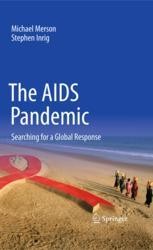New book provides insights on the AIDS pandemic—past, present, and future
A rigorous and unflinching account of the inspiration and dysfunction at the heart of the global response to the AIDS pandemic
Heidelberg | New York, 28 September 2017
 Dynamic leaders spearheaded the global response to the emergence of AIDS, but found themselves hampered by structural weaknesses in the United Nations, the political whims of governments, and the complexities of the disease itself, according to the authors of a new book.
Dynamic leaders spearheaded the global response to the emergence of AIDS, but found themselves hampered by structural weaknesses in the United Nations, the political whims of governments, and the complexities of the disease itself, according to the authors of a new book.
In The AIDS Pandemic: Searching for a Global Response, Michael Merson and Stephen Inrig identify key deficiencies and provide a clear analysis of the lessons that can, and should, be learned for improving the response to AIDS and future global pandemics.
This historical account illustrates how competitiveness, strategic differences, and donor fickleness hampered the global response. The story of the World Health Organization’s (WHO) Global Programme on AIDS (GPA), which initially led the global response but which donor governments shut down at the height of the pandemic, serves as a cautionary tale on how the global health community can respond to pandemics.
As a Director of GPA, Michael Merson both participated in and observed the global response during the crucial early years of pandemic. The book combines Merson’s personal experience with information and insights obtained from official documents, other sources, and more than 125 interviews with other major protagonists.
Despite the hurdles, much can be learned from the relentless commitment of charismatic leaders, courageous activists, and generous donors. Their efforts alleviated human suffering through effective early prevention programs and provision of AIDS care in the world’s poorest communities.
“Responding to a global pandemic like AIDS is a complex process,” said Merson. “It requires a multifaceted response, an understanding of the reality of the global health governance infrastructure, and accountability by those leading and funding the response.”
“Our hope is that Member States find the courage and political will to make the needed reforms in WHO in order for it to provide the necessary leadership,” said Inrig.
Michael Merson is founding director of the Duke Global Health Institute and the Wolfgang Joklik Professor of Global Health at Duke University. He worked at WHO between 1978 and 1995. As Director of the WHO Global Programme on AIDS, he led the effort to mobilize and coordinate the global response to the pandemic.
Stephen Inrig, a medical historian and health policy researcher, is Associate Professor of Health Policy and Management and Director of the Graduate Program in Health Policy and Management at Mount Saint Mary’s University in Los Angeles.
Michael Merson and Stephen Inrig:
The AIDS Pandemic: Searching for a Global Response
1st ed. 2018, XVIII, 445 p. 31 illus., 13 illus. in color.
Hardcover $149.00, €129.99, £97 ISBN: 978-3-319-47132-7
Also available in soft cover, ISBN: 978-3-319-48431-0 and as an eBook, ISBN: 978-3-319-47133-4.
Further information
About the Book:
Services for Journalists
Journalists can request a review copy of the book All Sides to an Oval.
Contact
Melanie Lehnert | Springer | Communications
tel +49 6221 487 8122 | melanie.lehnert@springer.com
